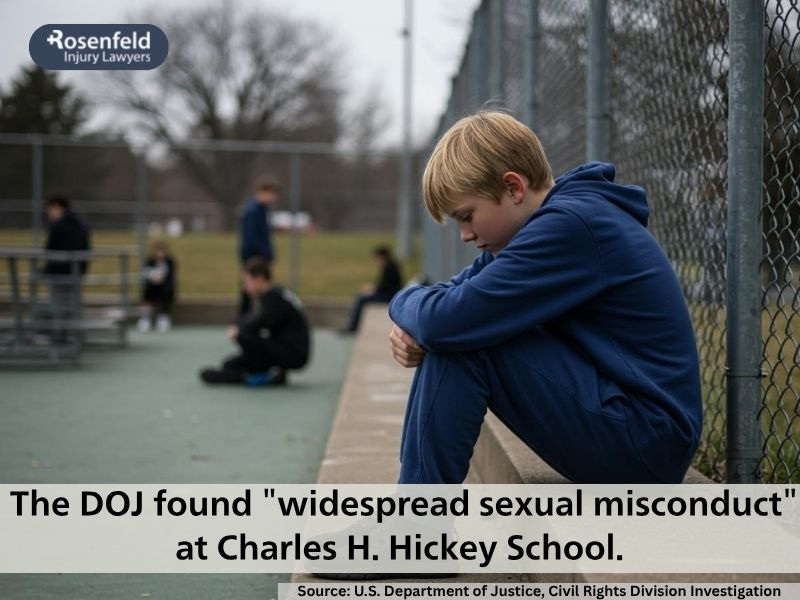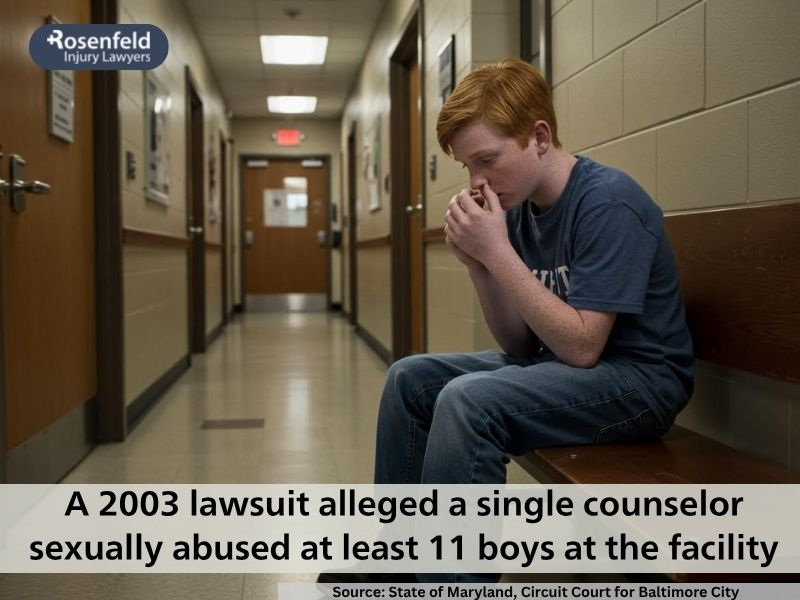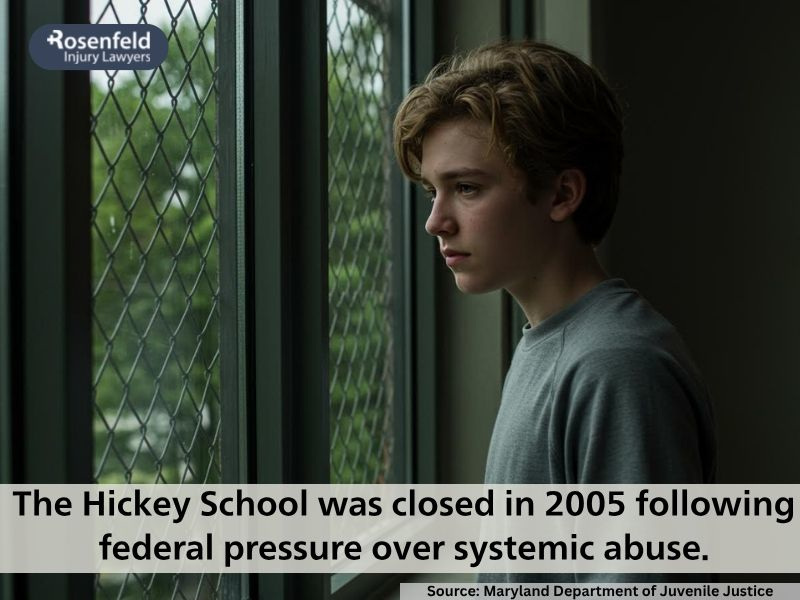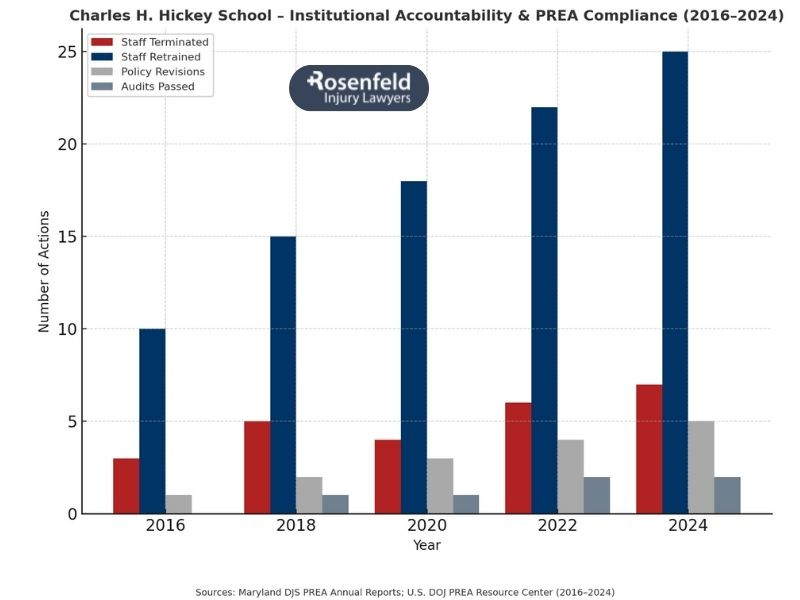Charles H. Hickey School Sexual Abuse Lawsuits
Compensation for Victims of Child Sexual Abuse
Injury Lawyer Team is committed to helping victims receive justice for Charles H. Hickey school sexual abuse. By filing Maryland youth detention sexual abuse lawsuits, we force the Maryland Department of Juvenile Services to take responsibility for its failure to protect children from sexual abuse. Contact us today for a complimentary consultation to discuss pursuing legal action.

Allegations of Abuse at Charles H. Hickey Jr. School in Baltimore
The Charles H. Hickey School was originally named the House of Refuge and was located on Frederick Avenue in Baltimore proper. It has held three other names during its time in service, including the Maryland School for Boys, the Maryland Training School for Boys, and its current name, which honors a former Baltimore County sheriff.
However, the detention center’s repeated rechristenings have not erased its notorious reputation for abuse. Thousands of people have filed sexual abuse lawsuits in Baltimore, so much so that Baltimore City had to issue an administrative order halting new survivors from filing lawsuits until their current case load can be reduced. This includes victims
Ronald Neverdon Allowed to Repeatedly Abuse Young People Without Consequence
Before the Baltimore administrative order was filed, multiple state agencies were sued for failing to protect almost 70 victims from Ronald Neverdon, a former employee at Charles H. Hickey Jr. School near Loch Raven on Old Harford Road in Baltimore City. He was indicted on 57 felony counts in April 2025 after being arrested for 38 counts of sexual abuse.
Neverdon was employed at the school from the 1960s to the 1990s. According to the Baltimore County government, the abuse occurred between 1976 and 1988 and involved at least six child victims.
The man sexually abused his victims on multiple instances and throughout the facility, including in his office, the gym, bathrooms, and residents’ rooms. Neverdon would also invite children to his house or the movies for the sole purpose of sexually assaulting them before returning them to the detention center.
In a classic case of grooming, Neverdon would tempt children with special privileges, including money, drugs, and expensive gifts. After assaulting them, he would threaten them with severe punishments if they failed to comply.
Lawsuits filed by survivors allege that representatives of the Maryland Department of Juvenile Services knew what was occurring and did not attempt to help. Other detainees were aware of the repeated abuse but were ignored when they attempted to warn facility staff members.
Institutional Negligence Predates Neverdon Allegations
Maryland’s juvenile justice system faced allegations of rampant child sexual abuse long before Neverdon was indicted for these felonies. A report published in the Maryland Law Review found that throughout the school’s history, it has been riddled with systemic failures, including sexual assaults, emotional abuse, and physical attacks against children.
In 1991, a city grand jury found that the school encouraged staff members to physically assault students, including slamming them into walls or isolating them from their peers for poor behavior. The issue was so severe that Maryland passed control of the facility to private companies contracted to administer it.
Upon investigation, officials found “an out-of-control wreck of a juvenile detention center where housing units reeked of urine, graffiti-covered walls, and locks didn’t work on the doors of the rooms of dozens of potentially dangerous offenders.”
Following these shocking allegations, the Maryland Department of Juvenile Services resumed control of the juvenile detention facility and secure treatment program in 2004 before closing the treatment program.
The government claims to have resolved many of the issues that led to rampant child sexual abuse, but complaints continue to pour in. In 2017 alone, there were four assaults at the juvenile detention center that sent children to the emergency room. Children were also denied medical care, including mental health treatment, and were excessively confined to their rooms.
Other Juvenile Detention Facility Staff Also Implicated
While Ronald Neverdon may have been the most egregious offender, he is far from the only one who exploited or assaulted children under his care.
The US Department of Justice initiated an investigation of the Hickey School in 2002, concluding its report in 2004. According to the report, staff members would physically attack students, including punching a boy in the face and chokeslamming another. The school hired one person with felony convictions for assault, and several female corrections officers sexually abused boys under their care.
One victim, Avery Fauntleroy, is one of thousands of victims seeking justice through civil lawsuits based on the Maryland Child Victims Act, having been subjected to repeated sexual abuse while held at the Maryland school. His childhood sexual abuse case occurred in 2008 with two unnamed corrections officers, and he was assaulted on at least five occasions.
Legal advocates have urged the government to close multiple Maryland juvenile detention centers, including those in Baltimore and Anne Arundel County, due to the severe psychological harm resulting from these systemic failures.
Despite the numerous allegations of childhood sexual abuse, the Maryland Department of Juvenile Services has indicated it has no intention of closing or reforming the juvenile detention facility.

What Laws Govern Sexual Abuse Cases Involving Maryland Juvenile Detention Centers?
Victims have two ways to pursue legal action for child sexual abuse: criminal trials and civil lawsuits. While these can be pursued separately, filing criminal charges supports a civil case.
First, the criminal definition of child sexual abuse is any act of sexual molestation or exploitation of a minor, regardless of whether physical injuries occur (Md. Code Criminal Law § 3-602).
There are additional criminal charges for those who are in a position of authority over the victim, which is a sexual offense in the fourth degree (Md. Code Criminal Law § 3-308). The law defines positions of authority to include anyone over the age of 21 who works at a public or private preschool, elementary school, or secondary school.
Someone over the age of 22 who works as a volunteer for a program and who exercises authority over minors in the program is also considered to abuse their authority.
The Maryland Child Victims Act removes all time limits on child sexual abuse cases, regardless of how long ago they occurred (Md. Courts & Judicial Proceedings § 5-117). The Maryland Supreme Court upheld the new law in February 2025, confirming that victims could continue to file lawsuits under these new statutory guidelines.
However, recent orders by the governor of Maryland added statutory caps and limits to the bill. These include the following:
- A single private defendant cannot receive more than $700,000 in total non-economic damages for child sexual abuse.
- Government liability is reduced to only $400,000 for any single claim.
Additionally, the law changes the verbiage of the Child Victims Act to reduce liability for defendants. Instead of “incident or occurrence,” it now uses “claim or claims.” This means that it does not matter how many times the defendant abused the child; all claims against a single defendant are treated as one (House Bill 1378).
While this reduces the overall compensation that survivors can receive for abuse in Maryland juvenile detention centers, the extended filing deadlines respect the lifelong suffering that sexual abuse causes, ensuring that every survivor can receive justice.
What Damages Can Sexually Abused Victims Recover?
Damages in juvenile detention center sexual abuse lawsuits can include:
- Medical expenses
- Loss of income
- Psychological counseling
- Physical pain and suffering
- Emotional distress
- Loss of normal life
What Factors Influence the Value of a Sexual Abuse Claim?
Each sexual abuse case is different, and there is no predetermined settlement. As such, several factors contribute to what you can receive.
- Duration of Abuse: Those who were abused over a period of months or years will receive more than those who were only assaulted once.
- Frequency and Severity: Assaults that involve physical violence or restraint are generally considered more severe than those that involve only verbal coercion, meaning that these survivors will receive higher compensation.
- Available Evidence: The strength of the evidence available will play a key role in your settlement. Medical records, police reports, employment records, and private communications can all substantiate your claims and ensure you have the best chance of success.
- Liability: Multiple parties may be liable for the abuse, each of whom will have to pay their fair share of a settlement. The number of defendants and their individual liability will determine how much the survivor can receive.

Who Can Be Held Liable in a Lawsuit Against a Juvenile Detention Facility?
Our firm will thoroughly investigate your claim to determine who can be held accountable for these injustices. Some potentially liable parties can include the following.
- Individual Perpetrator: The actual offender is the first party to a lawsuit. If they have passed away, then the lawsuit can still proceed against other parties to the suit.
- Other Staff and Employees: Every staff member has a legal and moral obligation to protect those under their care by reporting suspected abuse. If they did not do so, they could be held liable.
- Therapists and Social Workers: These mental health professionals are mandated reporters. If you disclosed the abuse to them and they did not immediately report their concerns, then they are responsible for negligence and malpractice.
- Supervisors and Managers: Any individual in a supervisory role should closely monitor interactions between their employees and children. Otherwise, they can be held liable for negligent supervision.
- Contractors: The Hickey School, like other detention centers, often has teachers, coaches, and others who provide services. Many of these contractors are mandated reporters, and all adults have an obligation to report suspected abuse. If they noticed an issue but did not speak up, then they are also vicariously liable.
- Third-Party Companies: The Hickey School was managed by private contractors for a significant period, from the late 1990s to the early 2000s. If the abuse occurred during this time period, the company may be liable, as may its contractors.
- Government Agencies: Currently, Maryland juvenile detention centers are managed by government agencies, which should be providing sufficient oversight to prevent harm to any children. If they failed to intervene or properly supervise their facilities, they are accountable.
How Long Do Survivors Have to Take Legal Action Under the Maryland Child Victims Act?
The Maryland statute of limitations for civil sexual abuse cases was removed by the Maryland Child Victims Act of 2023. If you were underage when the sexual abuse occurred, then you can file a claim at any time, no matter how much time has passed.
However, surviving family members of a deceased victim cannot bring a claim if the case would have been time-barred before October 1, 2023 (§5–117).
Although you may have unlimited time to file, it is still essential to take action promptly. Key evidence must be collected, and witnesses must be interviewed to ensure that they do not forget important details of what they witnessed. Contact Injury Lawyer Team today for a free consultation about your rights.

How Injury Lawyer Team Can Help
With over 25 years of experience representing survivors, we are highly familiar with the unique challenges posed by a Maryland sexual abuse lawsuit related to a juvenile detention center. Firstly, survivors may not disclose until years or decades after, during which time key evidence may have been lost or destroyed. Witnesses may also be difficult to secure, as they may have passed away or moved out of the area.
Another factor for cases involving juvenile offenders is the potential for victim-blaming. Both the defendant and the jury may attempt to damage the survivor’s reputation or point to their criminal history as evidence that they were an active participant in the abuse. We will shield you from these accusations and communicate with all third parties on your behalf so that you can focus on healing.
Our services include the following, all done according to the highest standards recommended by the American Association of Justice (AAJ).
- Case Evaluation: Insurance agencies and institutions will fight to minimize their liability and prevent you from receiving maximum compensation. We will carefully assess what damages you are entitled to under the law, including calculating your pain and suffering damages.
- Investigation: Building a strong case creates a better position for negotiation. Our skilled investigators will review medical records, employment records, incident reports, and other information to prove that the sexual abuse occurred.
- Witness Interviews: We take a trauma-informed approach to witness interviews, preventing retraumatization while empowering you to share your story. Additionally, we will locate and request interviews from those who were present at the time of the assaults, corroborating your details.
- Expert Testimony: Child psychologists and mental health experts can help verify that your injuries are consistent with abuse while also explaining any delays in filing, which improves your case.
- Negotiation: As members of the Million Dollar Advocates Forum, we have an outstanding track record of high settlements and verdicts. We will use the evidence we have collected, as well as details from similar verdicts, to push for the highest possible compensation available.
- Court Representation: Many cases settle out of trial, as a court case is both risky and time-consuming for the defendant. However, it is sometimes necessary to file a case. We will guide you through the entire process, including filing the complaint, sharing information with the other parties, attending hearings, and sharing your story in front of the court.
Injury Lawyer Team is a member of the National Association of Personal Injury Attorneys and works on a contingency fee basis. This means that our legal fees are deducted from your settlement. You don’t have to pay anything unless we secure a settlement or a favorable verdict for you.
Book a Free Consultation
Sexual abuse at the Charles H. Hickey School has led to lifelong trauma for survivors, and they deserve justice. We work on a contingency fee basis for every sexual abuse lawsuit: no fees unless we win.
Start the healing process today by contacting our compassionate attorneys for a free consultation
All content undergoes thorough legal review by experienced attorneys, including Jonathan Rosenfeld. With 25 years of experience in personal injury law and over 100 years of combined legal expertise within our team, we ensure that every article is legally accurate, compliant, and reflects current legal standards.








